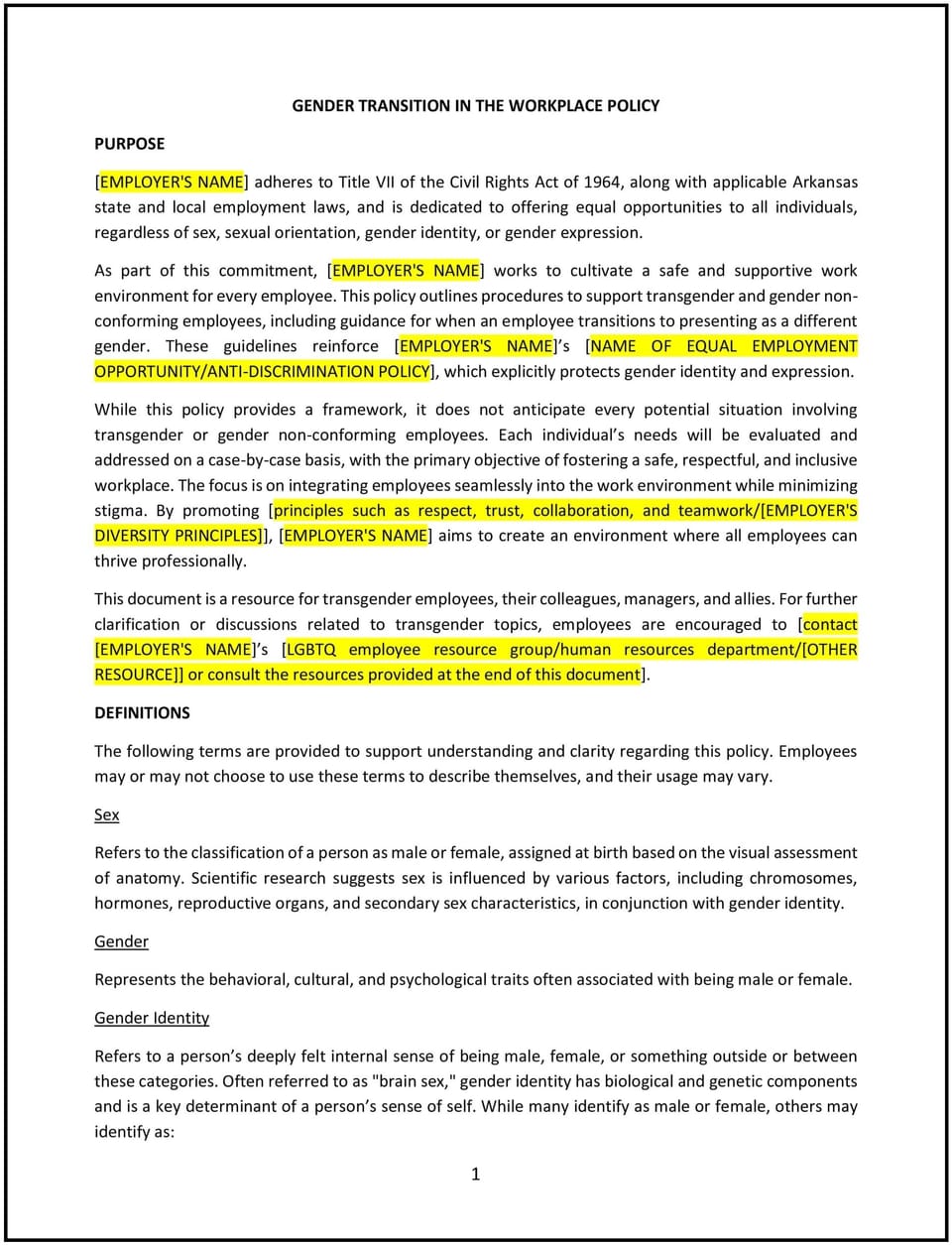Gender transition in the workplace policy (Arkansas): Free template

Gender transition in the workplace policy (Arkansas)
In Arkansas, a gender transition in the workplace policy provides businesses with guidelines to support employees undergoing gender transition. This policy fosters an inclusive and respectful environment, ensuring that transitioning employees feel supported while maintaining workplace harmony and compliance with anti-discrimination laws.
This policy outlines the business’s commitment to inclusivity, the process for addressing employee needs, and expectations for workplace behavior. By implementing this policy, Arkansas businesses can enhance employee morale, promote equity, and support compliance with applicable laws.
How to use this gender transition in the workplace policy (Arkansas)
- Define inclusivity: Clearly state the business’s commitment to respecting employees’ gender identity and creating a supportive environment.
- Establish support procedures: Outline steps for managers and HR to collaborate with transitioning employees, such as creating individualized transition plans.
- Provide training: Educate employees on gender identity, inclusive language, and respectful workplace behavior to foster understanding and prevent discrimination.
- Address workplace adjustments: Include guidelines for updating employee records, workplace facilities (e.g., restrooms), and communication of changes within the team.
- Enforce anti-discrimination: Reaffirm the business’s zero-tolerance policy for harassment or discrimination against transitioning employees.
Benefits of using this gender transition in the workplace policy (Arkansas)
This policy offers several advantages for Arkansas businesses:
- Promotes inclusivity: Fosters a workplace culture that values and respects all employees, regardless of gender identity.
- Enhances employee morale: Demonstrates the business’s support for diversity, leading to higher engagement and job satisfaction.
- Supports compliance: Aligns with Arkansas and federal anti-discrimination laws, reducing the risk of legal issues.
- Reduces workplace conflict: Establishes clear expectations for behavior, minimizing misunderstandings or tension.
- Attracts top talent: Positions the business as an inclusive employer, appealing to a broader and more diverse talent pool.
Tips for using this gender transition in the workplace policy (Arkansas)
- Address Arkansas-specific considerations: Ensure compliance with state anti-discrimination laws while aligning with federal protections for gender identity.
- Provide resources: Offer access to counseling, employee resource groups, or external support networks to assist transitioning employees.
- Communicate respectfully: Work with transitioning employees to determine how and when to communicate changes to colleagues.
- Monitor inclusivity: Regularly assess workplace culture and gather feedback to ensure the policy effectively supports transitioning employees.
- Update as needed: Review the policy periodically to reflect changes in laws, workplace practices, or employee needs.
Q: How does this policy benefit the business?
A: This policy promotes an inclusive workplace, enhances employee morale, and ensures compliance with Arkansas and federal anti-discrimination laws.
Q: What support can the business provide to transitioning employees?
A: The business can provide individualized transition plans, access to resources, and updates to workplace records and facilities as needed to support transitioning employees.
Q: How does this policy support compliance with Arkansas laws?
A: The policy aligns with Arkansas and federal anti-discrimination laws, ensuring equitable treatment of transitioning employees and reducing legal risks.
Q: How should managers handle questions from colleagues about a transitioning employee?
A: Managers should protect the transitioning employee’s privacy, use respectful and inclusive language, and provide training to the team to address questions appropriately.
Q: What steps should the business take if discrimination or harassment occurs?
A: The business should investigate promptly, take corrective action as outlined in its anti-discrimination policy, and provide support to the affected employee to ensure a safe and inclusive workplace.
This article contains general legal information and does not contain legal advice. Cobrief is not a law firm or a substitute for an attorney or law firm. The law is complex and changes often. For legal advice, please ask a lawyer.


